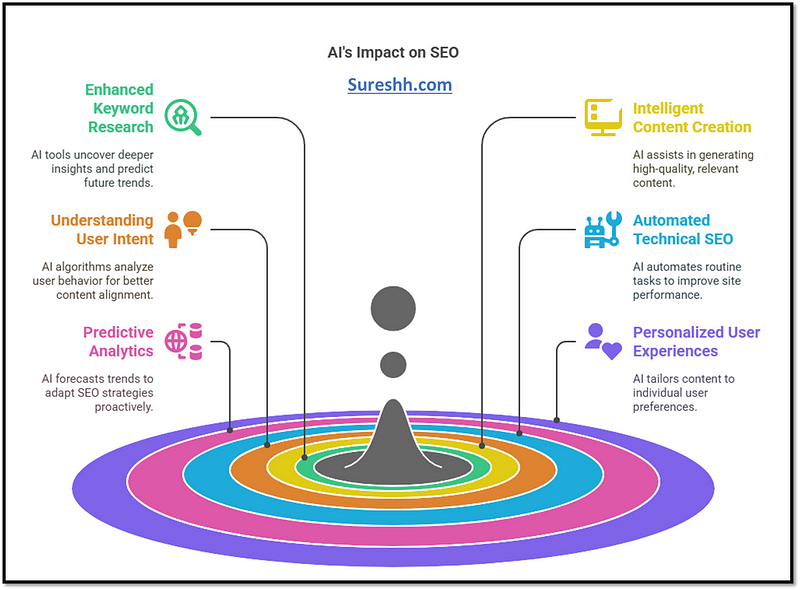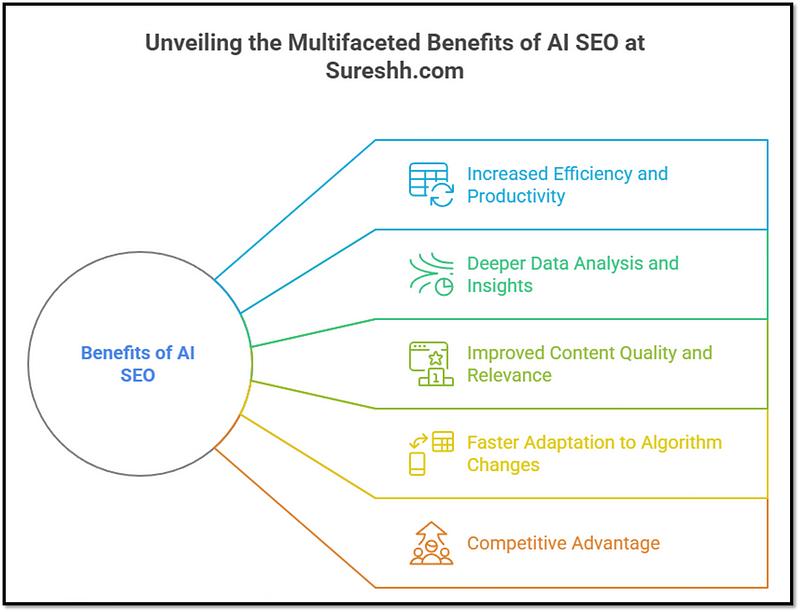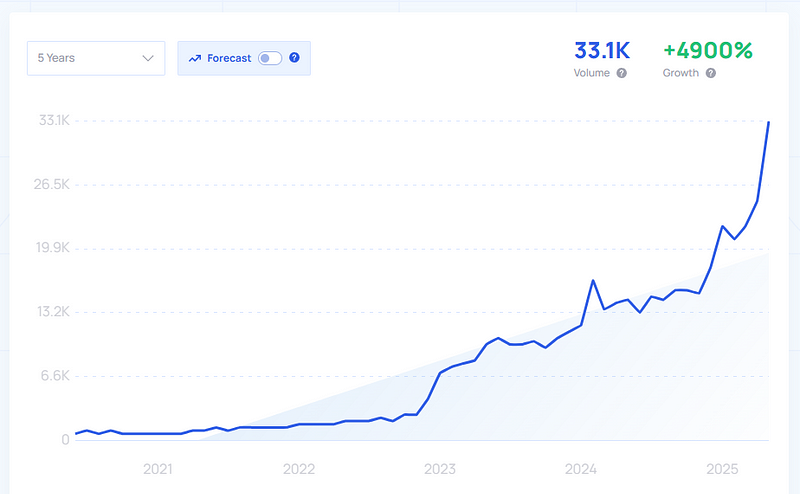AI is increasingly used in SEO (Search Engine Optimization) and is a rising trend this year.
AI SEO represents a powerful new approach that leverages artificial intelligence to optimize webpages, predict trends, and enhance content for higher rankings on search engine results pages (SERPs).
This new relationship between AI and SEO is redefining how businesses connect with their target audience and drive organic traffic.
Discover how AI SEO leverages artificial intelligence to optimize webpages, understand user intent, and boost your search engine rankings.
Learn to harness AI for powerful content and traffic growth.
What is AI SEO?
At its core, AI SEO is about using AI technologies, such as machine learning (ML) and natural language processing (NLP), to analyze vast amounts of data, understand user intent, and implement data-driven optimizations that would be impossible or incredibly time-consuming for humans alone.
It moves beyond traditional keyword stuffing and rigid rule-based SEO to a more nuanced, intelligent, and adaptive strategy.
How AI is Revolutionising SEO
AI’s impact on SEO can be seen across various crucial areas:

- Enhanced Keyword Research: AI-powered tools can delve deeper into search intent, identify semantic relationships between keywords, and uncover long-tail opportunities that traditional methods might miss. They analyze trending topics and predict future keyword relevance, allowing businesses to stay ahead.
- Intelligent Content Creation and Optimization: AI assists in generating high-quality, relevant, and engaging content by suggesting optimal structures, identifying content gaps, and even drafting outlines or full articles. It helps ensure content aligns with user intent, incorporates semantic keywords naturally, and is optimized for readability and clarity.
- Understanding User Intent: AI algorithms, like Google’s RankBrain, are designed to better understand the context and intent behind user queries. This means SEO strategies must shift from merely targeting keywords to truly satisfying the user’s information needs. AI helps analyze user behavior metrics (e.g., click-through rates, bounce rates, dwell times) to create more user-centric content.
- Automated Technical SEO: AI tools can automate routine yet critical technical SEO tasks such as site audits, identifying broken links, duplicate content, optimizing page load speed, and ensuring mobile-friendliness. They can also assist in generating schema markup (structured data) to help search engines better understand content.
- Predictive Analytics: AI can analyze historical data to forecast search trends and algorithm changes, allowing SEO professionals to adapt their strategies proactively and maintain a competitive edge.
- Personalized User Experiences: AI enables the creation of more personalized content experiences by understanding individual user preferences and tailoring recommendations accordingly,1 which contributes to better user engagement and higher rankings.
5 Key Benefits of Adopting AI SEO
The advantages of integrating AI into your SEO strategy are significant:

- Increased Efficiency and Productivity: Automating time-consuming tasks like keyword research, content audits, and basic content generation frees up SEO professionals to focus on higher-level strategic planning and creative initiatives.
- Deeper Data Analysis and Insights: AI can process and analyze massive datasets with unparalleled speed and accuracy, revealing patterns, trends, and correlations that human analysts might miss. This leads to more informed and data-driven decisions.
- Improved Content Quality and Relevance: By understanding user intent and semantic relationships, AI helps create content that is not only optimized for search engines but also truly valuable and engaging for the audience.
- Faster Adaptation to Algorithm Changes: AI tools can learn from performance data and adapt quickly to evolving search engine algorithms, ensuring your SEO strategies remain effective.
- Competitive Advantage: Businesses leveraging AI-powered SEO can gain a significant edge by optimizing their online presence more effectively and responding to market shifts with greater agility.
Optimising Content for Large Language Models (LLMs)
With the rise of LLMs like ChatGPT and Gemini, search is evolving.
These models often provide direct answers or summaries, which means content needs to be optimized differently to be “picked up” by them.
Here’s how to prepare your content for LLMs:
- Focus on Entities and Semantic SEO: LLMs understand concepts and relationships between them (entities) rather than just exact keywords. Ensure your content uses a rich vocabulary of related terms and demonstrates a deep understanding of the topic.
- Prioritize Clarity, Conciseness, and Structure: LLMs excel at extracting information from well-organized content. Use clear headings (H1, H2, etc.), short paragraphs, bullet points, and summaries. Make it easy for an LLM to grasp the core information quickly.
- Answer Questions Directly: LLMs are designed to provide direct answers to user queries. Structure your content to clearly and concisely answer common questions related to your topic, perhaps through dedicated FAQ sections.
- Emphasize Expertise, Experience, Authoritativeness, and Trustworthiness (E-E-A-T): LLMs, like traditional search engines, prioritize credible and authoritative sources. Ensure your content is accurate, well-researched, and backed by expertise. Cite reputable sources and build a strong backlink profile.
- Think Topics, Not Just Keywords: Instead of singularly focusing on individual keywords, develop content that comprehensively covers a topic from various angles, addressing all related sub-topics and user intents.
- Optimize for Multimodal LLMs: As LLMs become more multimodal, consider optimizing visual content with relevant alt tags and captions, and embed structured data to help them understand images and other media.
- Leverage User-Generated Content (UGC): Encourage reviews, ratings, and feedback. This authentic content can provide valuable data for LLMs and build trust.
The Future of AI SEO
The integration of AI and SEO is not a fleeting trend but a fundamental shift.
The future of AI SEO will likely see:
- More Sophisticated Personalization: AI will enable even more granular personalization of search results and content experiences.
- Predictive SEO Becoming Standard: Businesses will increasingly rely on AI to forecast future search trends and algorithm updates, allowing for proactive strategy adjustments.
- AI as an SEO Co-Pilot: AI tools will continue to augment human capabilities, allowing SEO GEO professionals to focus on strategic thinking, creativity, and refining AI outputs. Human oversight and ethical considerations will remain paramount.
- The Rise of AI Overviews and Generative Search Experiences: As search engines like Google continue to integrate generative AI features, optimizing for direct answers and AI-generated summaries will become increasingly critical.
6 Best Practices for AI SEO at Sureshh.com
To effectively harness the power of AI in your SEO efforts, consider these best practices:
- Combine AI with Human Expertise: AI is a powerful assistant, but human creativity, strategic thinking, and ethical judgment remain indispensable. Use AI to automate and analyze, but let human experts guide the overall strategy and refine the output.
- Focus on User Intent and Value: Always prioritize creating content that genuinely answers user questions and provides value. AI helps you understand this intent better.
- Prioritize Quality Over Quantity: AI can help you produce content faster, but never sacrifice quality. High-quality, in-depth, and well-researched content will always rank better.
- Embrace Structured Data: Implement schema markup to help search engines and LLMs understand your content’s context and relevance.
- Monitor and Adapt: AI SEO is an iterative process. Continuously monitor your performance metrics, analyze AI-driven insights, and adapt your strategies based on new data and algorithm changes.
- Stay Informed about AI and Search Updates: The AI and SEO landscapes are constantly evolving. Stay informed about the latest developments from search engines and industry experts.
In conclusion, AI SEO is not just a technological advancement; it’s a paradigm shift in how we approach online visibility.
By embracing AI’s analytical power and combining it with human ingenuity, digital marketers and businesses can unlock new levels of efficiency, effectiveness, and relevance, ensuring their content not only ranks higher but truly resonates with their audience in the age of intelligent search.
Need Help? Meet Suresh, The Best AI SEO Expert from India
Suresh Chaudhary is a leading AI SEO expert, bringing 15+ years of experience in digital marketing. He helps companies thrive online through strategic AI SEO, Content Marketing, Paid Media and more, always focused on real outcomes. Suresh uses AI to refine everything from keyword research to content for new AI models, making sure your brand stands out in search.
